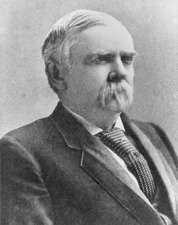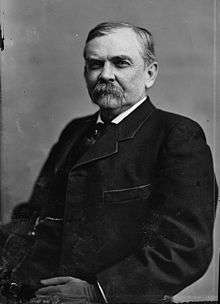George Graham Vest
| George Vest | |
|---|---|
 | |
| United States Senator from Missouri | |
|
In office March 4, 1879 – March 3, 1903 | |
| Preceded by | James Shields |
| Succeeded by | William Stone |
| Confederate States Senator from Missouri | |
|
In office January 12, 1865 – May 10, 1865 | |
| Preceded by | John Clark |
| Succeeded by | Constituency abolished |
| Member of the C.S. House of Representatives from Missouri's 5th district | |
|
In office February 18, 1862 – January 12, 1865 | |
| Preceded by | Constituency established |
| Succeeded by | Constituency abolished |
| Member of the Missouri House of Representatives | |
|
In office 1860 | |
| Personal details | |
| Born |
December 6, 1830 Frankfort, Kentucky, U.S. |
| Died |
August 9, 1904 (aged 73) Sweet Springs, Missouri, U.S. |
| Political party | Democratic |
| Alma mater |
Centre College Transylvania University |
George Graham Vest (December 6, 1830 – August 9, 1904) was a U.S. politician. Born in Frankfort, Kentucky, he was known for his skills in oration and debate. Vest, a lawyer as well as a politician, served as a Missouri Congressman, a Confederate Congressman during the Civil War, and finally a US Senator. He is best known for his "a man's best friend" closing arguments from the trial in which damages were sought for the killing of a dog named Old Drum on October 18, 1869.
Early life and career
Vest graduated from Centre College, Danville, Kentucky, in 1848 and from the law department of Transylvania University, Lexington, Kentucky, in 1853. He was admitted to the bar in 1853 and planned to move to California. However, while en route, he stopped in Pettis County, Missouri, where he defended a young African-American man accused of murder. Vest's client was acquitted but soon burned at the stake by an angry mob. Vest's own life was also threatened, but he nonetheless decided to stay in Missouri permanently, settling in Georgetown. In 1854 he married Sallie Sneed of Danville, Kentucky. They had three children, two sons and a daughter.
Initial public service
In 1860, after moving to Boonville, Missouri, he was elected to the Missouri House of Representatives and served as a Democratic presidential elector. As a Missouri representative he was chairman of the Committee on Federal Relations. Vest served in the House until late 1861 during which he wrote the Vest Resolutions in which he denounced coercion of the South.
When the Civil War broke out Vest was a strong "states rights" advocate during the Missouri secession crisis, and eventually sided with the Confederacy. He proposed the Secession Ordinance that was passed by the Missouri legislature in October 1861. The following year, he briefly served as judge advocate with the Army of Missouri, commanded by former Governor Sterling Price. He served in the House of Representatives of the Confederate Congress from February 1862 to January 12, 1865, when he resigned, having been appointed to fill a vacancy in the Confederate Senate.
Old Drum
After the war he returned to Pettis County moving to Sedalia, Missouri, and resumed his law practice. It was at this time in 1869 that Vest was asked to represent Charles Burden and Old Drum in the case that would make him famous, Burden v. Hornsby.
Vest took the case tried on September 23, 1870, in which he represented a client whose hunting dog, a foxhound named Drum (or Old Drum), had been killed by a sheep farmer, Leonidas Hornsby. The farmer (Burden's brother-in-law) had previously announced his intentions to kill any dog found on his property; the dog's owner was suing for damages in the amount of $50 ($971 2015 inflation adjusted), the maximum allowed by law.
During the trial, Vest stated that he would "win the case or apologize to every dog in Missouri." Vest's closing argument to the jury made no reference to any of the testimony offered during the trial, and instead offered a eulogy of sorts. Vest's "Eulogy on the Dog" is one of the most enduring passages of purple prose in American courtroom history (only a partial transcript has survived):
| “ | Gentlemen of the jury: The best friend a man has in this world may turn against him and become his enemy. His son or daughter that he has reared with loving care may prove ungrateful. Those who are nearest and dearest to us, those whom we trust with our happiness and our good name, may become traitors to their faith. The money that a man has, he may lose. It flies away from him, perhaps when he needs it the most. A man's reputation may be sacrificed in a moment of ill-considered action. The people who are prone to fall on their knees to do us honor when success is with us may be the first to throw the stone of malice when failure settles its cloud upon our heads. The one absolutely unselfish friend that a man can have in this selfish world, the one that never deserts him and the one that never proves ungrateful or treacherous is his dog.
Gentlemen of the jury: A man's dog stands by him in prosperity and in poverty, in health and in sickness. He will sleep on the cold ground, where the wintry winds blow and the snow drives fiercely, if only he may be near his master's side. He will kiss the hand that has no food to offer, he will lick the wounds and sores that come in encounters with the roughness of the world. He guards the sleep of his pauper master as if he were a prince. When all other friends desert, he remains. When riches take wings and reputation falls to pieces, he is as constant in his love as the sun in its journey through the heavens. If fortune drives the master forth an outcast in the world, friendless and homeless, the faithful dog asks no higher privilege than that of accompanying him to guard against danger, to fight against his enemies, and when the last scene of all comes, and death takes the master in its embrace and his body is laid away in the cold ground, no matter if all other friends pursue their way, there by his graveside will the noble dog be found, his head between his paws, his eyes sad but open in alert watchfulness, faithful and true even to death. |
” |
Vest won the case (the jury awarded $50 to the dog's owner) and also won its appeal to the Missouri Supreme Court. A statue of the dog stands in front of the Warrensburg, Missouri, courthouse and a bust of the dog resides in the Missouri Supreme Court building in Jefferson City, Missouri.
Movie depictions
The speech has been used in movies which are set in Missouri and involve sheep owners who allegedly shoot the dog but are then shot themselves by the dog's owners, who are then tried for murder.
- The Voice of Bugle Ann – 1936
- Tribute to the Dog, episode 9, season 13 of Death Valley Days (TV series), featuring Ronald Reagan in the role of George Vest – 1964
- The Trial of Old Drum – 2000
U.S. Senate

In 1877 Vest moved to Kansas City, Missouri, where he was elected two years later in 1879 to the United States Senate. He was chairman on the Committee on Public Buildings and Grounds (Fifty-third Congress) and served on the Committee on Epidemic Diseases (Fifty-fourth Congress), Committee on Public Health and National Quarantine (Fifty-fourth through Fifty-seventh Congresses). He was re-elected for three more terms in 1885, 1891 and 1897 and remained a US Senator until March 4, 1903, when he retired from public life due to ill health.
Defender of Yellowstone
In 1882, Vest became aware of concession abuses and outright attempts at uncontrolled monopolies being proposed for Yellowstone National Park concessions by the railroads and other businessmen. He introduced and eventually helped pass legislation that required the Secretary of Interior to submit concession and construction contracts to the Senate for oversight thus stifling potential corruption and abuses. Throughout the remainder of his Senate career, Vest was considered the "Self-appointed Protector of Yellowstone National Park."[1]
"History is written by the victors"
Although the origin of the phrase "history is written by the victors" is not definitively known, Vest employed it in his 1891 speech to the Missouri ex-confederate convention, and may have been its originator. "In all revolutions the vanquished are the ones who are guilty of treason, even by the historians, for history is written by the victors and framed according to the prejudices and bias existing on their side."[2]
Death
On August 9, 1904, Vest died at his summer home in Sweet Springs, Missouri, the last living Confederate States Senator. He was buried at Bellefontaine Cemetery in St. Louis, Missouri.
Notes
- ↑ Bartlett, Richard A. (1885). Yellowstone-A Wilderness Besieged. Tucson, AZ: University of Arizona Press. pp. 139–141. ISBN 0-8165-1098-9.
- ↑ "Vest on Secession," Abilene Weekly, August 27, 1891, p. 1
External links
- The Trial of Old Drum (2000) (TV) on IMDb, loosely based on the Old Drum case
United States Congress. "VEST, George Graham (id: V000091)". Biographical Directory of the United States Congress.
- Death Valley Days "Tribute to the Dog" (1964) on IMDb
- A Tribute to the Best Friend of Man: Eulogy of the Dog (Violet Press 2008) A verbatim transcript of the speech read into the Congressional Record in 1916, newly illustrated by Jackie Ehle
| Confederate States House of Representatives | ||
|---|---|---|
| New constituency | Member of the C.S. House of Representatives from Missouri's 5th congressional district 1862–1865 |
Constituency abolished |
| Confederate States Senate | ||
| Preceded by John Clark |
Confederate States Senator (Class 1) from Missouri 1865 Served alongside: Waldo Johnson |
Constituency abolished |
| U.S. Senate | ||
| Preceded by James Shields |
United States Senator (Class 3) from Missouri 1879–1903 Served alongside: Francis Cockrell |
Succeeded by William Stone |

